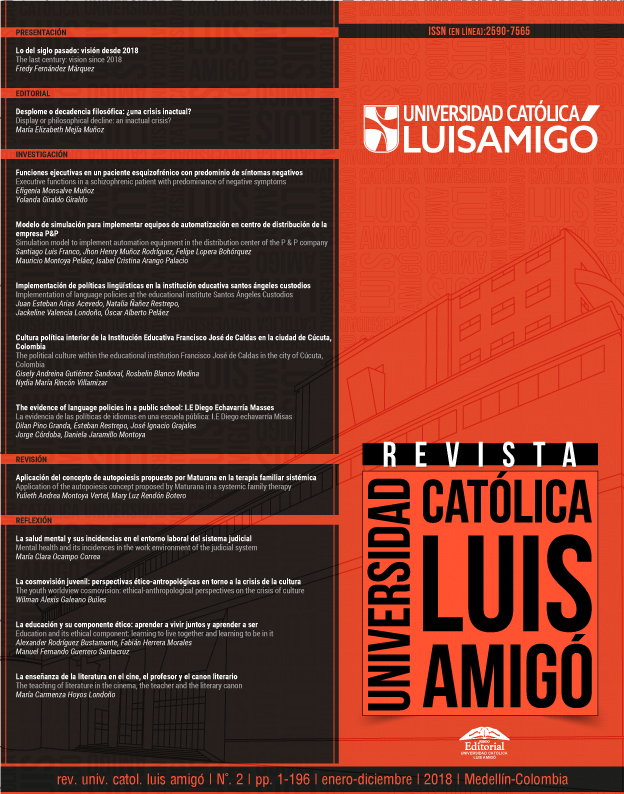Education and its ethical component: learning to live together and learning to be in it
DOI:
https://doi.org/10.21501/25907565.3050Keywords:
Education, School, Coexistence, Transformation.Abstract
The present text has been written with three voices to ratify the idea of why education today continues to be the basis for our society that constantly shouts the need to return to the essentials: living together and living with others. Schools from their institutionality, summons us to think about it, from their everyday discourses, corporalities, meanings, signifiers, jumps, colors, encounters and disagreements. The following pages are not intended to be a formula for thinking about the School system and how to transform it but more as a calling to all with the intention of living it as a possibility and as a permanent encounter of our voices as a way to learn and to be.Downloads
References
Amar-Amar, J. (2000). La función social de la educación. Investigación & Desarrollo, (11), 74- 85.
Aristóteles (1960). Ética a Nicómaco. Libro Primero (Tomo 3). Buenos Aires, Argentina: Ediciones Clásicos Jackson.
Bauman, Z. (2009). Los retos de la educación en la modernidad líquida. Madrid, España: Gedisa.
Corte Constitucional de Colombia. (1992). Sentencia T-002. [M. P. Alejandro Martínez Caballero]. Recuperado de http://www.corteconstitucional.gov.co/relatoria/1992/T-002-92.htm.
Di Marco, G. (2006). Hacia una sociedad inclusiva: Democratización, ciudadanía y derechos humanos. Anales de la Educación Común, 2(4), 116-127.
Donati, P. (2015). El reto educativo: análisis y propuestas. Educación y Educadores, 18(2), 307-329. doi: 10.5294/edu.2015.18.2.7.
López, G. y Rodríguez, A. (2017). Nuevas crianzas para nuevas infancias: hacia nuevas representaciones y transformaciones familiares para la paz. En D. S. Muñoz-Gómez (Comp.), Mi casa, territorio de paz (pp. 290-303). Recuperado de https://www.unisabana.edu.co/fileadmin/Archivos_de_usuario/Documentos/Documentos_Empresa_y_Sociedad/Instituto_de_La_Familia/mi_casa_territorio_paz_31jul.pdf.
Muñoz Gaviria, D. (2014). Antropología filosófica relacional en la obra de Paulo Freire: diálogos con la teoría crítica de Karl Marx. Perseitas, 2(2), 186–203. doi:https://doi.org/10.21501/23461780.1301
Rodríguez-Bustamante, A., López-Arboleda, G. y Echeverri-Álvarez, J. (2017). El aula de paz: familia y escuela en la construcción de una cultura de paz en Colombia. Perseitas, 5(1), 206-223. doi: http://dx.doi.org/10.21501/23461780.2243.
Rodríguez Bustamante, A., Herrera Saray, G. D., Bañol López, W., y Vanegas Acevedo, K. (julio-diciembre, 2018). Educación y escuela: espacio para la ciudadanía, convivencia y diálogos. Poiésis, (35), 41-51. DOI: https://doi.org/10.21501/issn.1692-0945
Rodríguez, D. (s.f.). Principales tendencias en el desarrollo de la pedagogía en la contemporaneidad. Nayarit, México: Universidad de Baja California.
UNESCO. (2005). EFA Global Monitoring Report. Paris, France: UNESCO. Recuperado de http://unesdoc.unesco.org/images/0013/001373/137334e.pdf.
Vasco, C. e Isaza, G. (2002). Piaget y Vigotsky: Diferencias y convergencias. Revista Educación y Pedagogía, XIV(33), 223-239. Recuperado de http://aprendeenlinea.udea.edu.co/revistas/index.php/revistaeyp/article/view/24803/20225.
Downloads
Published
How to Cite
Issue
Section
License
PROPIEDAD INTELECTUAL
Los autores son moral y legalmente responsables del contenido de sus artículos, así como del respeto a los derechos de autor. Por lo tanto, éstos no comprometen en ningún sentido a la Universidad Católica Luis Amigó.
La reproducción de los artículos se regirá conforme a lo descrito en http://creativecommons.org/licenses/by-nc-sa/4.0/

